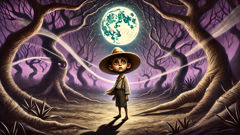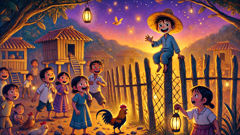Introduction
In the emerald heart of El Salvador, where mist clings to mountain peaks and the scent of ripe mangos drifts along the riverbanks, villagers still tell stories of Cipitio. He is the boy who never grows up, a spirit as old as the hills yet forever ten years old. At dusk, when the golden light softens the outlines of ceiba trees and fireflies begin to wink along the path, grandmothers gather children on woven mats to whisper his legend. They say Cipitio appears with a mischievous grin, a wide straw hat too large for his head, and feet that point backwards, leaving impossible trails through the mud. Some claim to have seen him skipping stones across a silver lake or giggling in the cornstalks just as the wind picks up. In every telling, he brings laughter and confusion in equal measure, delighting in harmless pranks—salt in the sugar jar, footprints on the rooftop, a chorus of frogs singing his name. Yet behind the playful tricks lies a deeper wisdom, a story of curses, forgiveness, and the undying spirit of youth. The legend is as much a warning as a comfort, reminding listeners that there is magic in the world for those willing to see it, and that sometimes the smallest, most unlikely figures hold the power to change destinies. It is a tale woven into the very fabric of Salvadoran life, echoing through generations, alive as the hummingbirds that dart between hibiscus blossoms at dawn. To know Cipitio is to glimpse the heart of a land both ancient and ever-young, where the boundary between myth and reality shimmers like heat over the volcanic earth.
The Birth of a Legend: Cursed by the Moon and Shadows
Long before the highways carved lines through El Salvador’s countryside, before even the Spanish ships breached the Pacific horizon, the land thrummed with stories and spirits. In those early days, the valley of Izalco was a patchwork of maize fields, thick jungle, and cool mountain streams, watched over by gods and haunted by things half-glimpsed in the dusk. Here, in a humble clay hut by the edge of the forest, a woman named Sihuehuet peered each night into the shadows, clutching her secret tight as the roots of the ceiba tree clutch the earth. She was beautiful, they said, with hair like black silk and eyes deep as midnight wells. But her beauty was shadowed by pride and forbidden longing.

Sihuehuet was not alone in her heart. She had loved the wrong man—a great chieftain’s son, who wooed her with songs and promises but vanished when dawn broke. Their union was forbidden by the old ways, and when her son was born, the villagers whispered that he was marked by the moon and shadows. His name was Cipitio—a name that meant little at first, but would grow weighty as a curse.
The gods watched with cold indifference. They saw Sihuehuet’s pride and her refusal to repent. In their anger, they cursed her child. He would never grow old, never know the joys or sorrows of adulthood. Forever ten, forever wandering, Cipitio would carry the mark of his origins: a wide-brimmed straw hat shielding his face, a belly always full yet always hungry, and feet turned backwards so no one could ever track him. He would be neither child nor man, always other, always between.
At first, Cipitio did not know he was different. He played beneath the mango trees, chased iguanas through fields of wildflowers, and watched his mother with wide, trusting eyes. But as years passed, he noticed the village boys outgrowing him. Their voices deepened and their shoulders broadened while he remained small and unchanged. The villagers grew wary. Whispers followed him—first about his mother, then about his laugh, and finally about his feet. When he wandered too close to the river at night, frogs would erupt into strange songs, and the elders would cross themselves against evil spirits.
Sihuehuet wept for her son, but her pride would not let her beg forgiveness. One moonless night, she vanished into the jungle, leaving Cipitio alone with nothing but her hat and a handful of memories. Heartbroken but resilient, Cipitio wandered the valleys and hills. The land itself seemed to accept him—birds perched on his shoulder, armadillos rolled at his feet, and even the fickle rivers shifted course to greet him. In solitude, Cipitio discovered his gift: a knack for mischief, for bending the rules of the world to his own delight.
He became a legend in his own time, slipping between villages and mountains. No one could follow his tracks, for his feet always pointed away from where he’d been. He stole eggs and replaced them with pebbles, tied the tails of sleeping donkeys together, and left mysterious symbols etched in riverbank mud. Some said he was a spirit of luck; others, a harbinger of chaos. But no matter how much trouble he stirred, Cipitio’s tricks were never cruel. He delighted in confusion and laughter, not pain. Through mischief, he found solace—a way to weave himself into the world that had shunned him.
Over centuries, the story of Cipitio grew. His image appeared in clay carvings, his laugh echoed in lullabies, and his legend became a thread in the rich tapestry of Salvadoran folklore. Yet beneath every prank was a longing—a wish to belong, to be seen not as a curse but as a boy with a heart as big as the sky.
The Mischief of Cipitio: Trickster in the Valleys
Cipitio’s legend truly blossomed in the patchwork villages along El Salvador’s winding rivers. In the town of Panchimalco, where houses clung to steep hills and marigolds crowded every doorstep, children gathered in the plaza each evening, hoping for a glimpse of the eternal boy. Their parents warned them to keep away—Cipitio’s tricks could lead the unwary astray—but still, curiosity grew like vines after a summer rain.

One early morning, as mist curled over the maize fields, old Doña Rosa discovered her prized chickens clucking in confusion. Their eggs had vanished overnight, replaced by tiny pebbles painted the color of the sunrise. Laughter echoed from the woods. The villagers searched for tracks, but only found a trail of footprints pointing away from every direction at once. The culprit was clear.
Cipitio’s pranks were many: He salted the villagers’ drinking water so that tea tasted like the ocean; he scattered fireflies in jars, only to release them just as night fell, lighting up the entire town like a festival. He would sit cross-legged on fenceposts, swinging his legs and blowing kisses at passing girls, who would burst into giggles at his antics. Sometimes he left riddles written in chalk on the plaza stones—solved only by the cleverest child, who would find a bouquet of wildflowers as a prize.
But Cipitio’s mischief had purpose. He targeted the greedy and the proud, humbling the local merchant who hoarded corn by making his sacks sprout bean plants overnight, or exposing a corrupt mayor by leading him in circles through the jungle until sunrise. To the poor and kind-hearted, Cipitio brought luck: a pot of gold coins left beneath a sleeping mat, or a lost puppy returned with a sprig of mint tucked behind its ear.
Not everyone saw the humor in his tricks. One evening, Don Francisco—renowned for his temper—grew enraged after finding his garden transformed. Every tomato had been replaced with bright red chilies, and every bean vine now bore tiny yellow flowers. As Francisco stormed about, Cipitio perched in a nearby tree, tossing mangos and singing songs about patience and humility. When confronted, he only grinned and asked, “Why be angry when the world gives you spice instead of sweetness?”
Children adored Cipitio. They followed his laughter through the fields, hoping for a blessing or a secret. Sometimes, he led them to hidden springs or taught them how to catch butterflies in cupped hands. He warned them never to wander too far or cross rivers at night, for darker spirits also roamed the land. Through his playful guidance, children learned caution without losing their sense of wonder.
Cipitio’s greatest mischief came during the Festival of the Corn Moon. That year, villagers prepared a grand feast, with tamales and pupusas stacked high on every table. As the moon rose full and golden, Cipitio appeared on the church rooftop, dancing with a cluster of bats. Suddenly, every lantern flickered out—only to be relit moments later by thousands of fireflies swirling in patterns overhead. The villagers gasped as glowing shapes formed: a heart, a maize stalk, and finally, a laughing boy with a wide-brimmed hat. For a moment, even the adults forgot their worries and joined in the laughter.
Afterward, as midnight approached and families gathered for stories, children begged for tales of Cipitio’s origin. The elders spoke softly, reminding all that beneath his laughter was a boy who longed for acceptance—a lesson woven into every prank and riddle he left behind.
Cipitio’s Secret: The Spirit of Forgiveness
For all his laughter and lightheartedness, Cipitio carried a secret as heavy as the volcanic stones that dotted the valley. The villagers believed he was content—a spirit immune to sorrow or regret—but in truth, the weight of his mother’s curse pressed upon him each night as he wandered alone under the stars.

One rainy season, when the rivers swelled and roads turned to streams of mud, a stranger arrived in the village of Teotepeque. She wore a shawl the color of dusk and spoke with a voice that trembled like wind through bamboo. Some called her a healer; others, a ghost. Children whispered that she walked without leaving footprints. Only Cipitio recognized her—after all these years, his mother had returned, older but still proud, her hair now streaked with silver.
Sihuehuet came to seek forgiveness from her son. She found him by the riverbank, skipping stones and singing to the dragonflies. When she called his name, he turned but did not run. They sat together in silence, interrupted only by the croak of frogs and the rush of water. Sihuehuet confessed her regrets—the pride that blinded her, the fear that drove her away. She reached for Cipitio’s hand, but he hesitated, unsure if forgiveness could undo centuries of loneliness.
Cipitio listened quietly, heart pounding. He remembered every moment of abandonment—the days spent searching for her face among festival crowds, the nights spent talking to stars for comfort. He wanted to rage, to demand why she left him cursed and alone. Yet as he looked into her tired eyes, he saw not a goddess or villain but a woman burdened by sorrow. He realized forgiveness was not a gift for her alone—it was a key to his own freedom.
As dawn broke over the river, painting the sky in hues of rose and gold, Cipitio placed his mother’s old hat on her head. “We are both cursed,” he said softly. “But maybe our curses can become blessings for others.” Together, they wandered through the waking village. Sihuehuet helped heal the sick and blessed the harvest; Cipitio played with the children, teaching them not just tricks but also kindness and courage. The villagers watched in awe as mother and son mended wounds both seen and unseen.
In time, Sihuehuet faded into legend once more, her spirit returning to the wild places she loved. But Cipitio changed after their reunion. His mischief softened, becoming more generous. He encouraged children to forgive one another, to look for joy even in hardship. He left gifts for the lonely and listened to the sorrows of old women by their firesides. Though he remained forever young, something ancient and wise now shone in his laughter.
The legend spread far beyond Izalco. In distant towns, families set out bowls of water and sweet corn at night—offerings for Cipitio, in hopes he would bless their homes with luck and laughter. His story became more than a tale of tricks; it became a lesson in compassion and the enduring power of forgiveness.
Conclusion
So the legend of Cipitio endures, woven into every sunrise over El Salvador’s valleys and whispered in the laughter of children chasing fireflies through dusk. He is more than a trickster or a spirit cursed to eternal youth—he is a living reminder that mischief can teach wisdom, and forgiveness can heal wounds deeper than time. Each prank is a lesson; each riddle, a chance to grow. The villagers who once feared his backwards feet now leave out sweets and water, hoping for his blessing. Parents tell their children that it’s all right to be different, to laugh at life’s riddles, and to show kindness even when hurt. In every playful echo of Cipitio’s giggle is the enduring heart of El Salvador: resilient, joyful, and always young. To believe in Cipitio is to believe that magic still threads through the world, waiting for those who dare to see with wonder and forgive with courage.


















